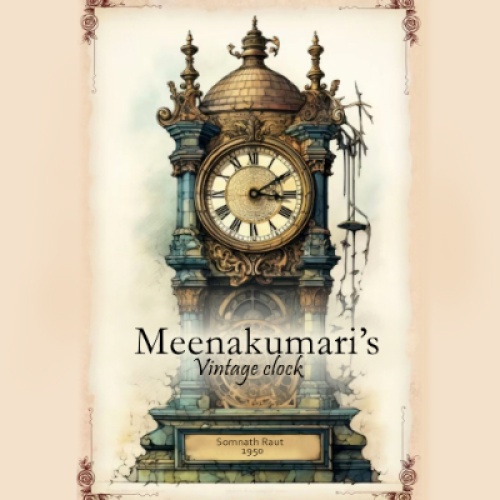It was a holiday. Meenakumari returned from the temple and walked past my father, who was watching a tennis match on television. On her way, she noticed my brother, headphones on, and completely absorbed in his computer game. She continued past my mother, who was busy making plans for evening tea with her friends, and finally entered her room.
I was about to join my father when she turned back, paused at the doorway, and gestured for me to come. As I reached her room, she closed the door behind us. Gathering all her strength, she looked at me and asked, "Will you teach me to read?"
Meenakumari is my seventy-four-year-old grandmother. I call her by her name, which always amuses her and makes her chuckle every time.
The announcement of flight boarding pierced through my thoughts, pulling me out of yesterday's memories and back into the bustling reality of the airport. I was heading to Bangalore for a month-long project.
As I settled into the flight, my grandmother's sudden desire to learn to read pulled me back into my memories. It had been her decision to move to the city after Grandpa passed away, so her children wouldn't be deprived of a good education. Because of that, my father and two uncles were well-settled, and eventually, I found stability, too.
I had heard these stories from others, but from my grandmother, all I ever received were her smiles and compassionate words. After my father and uncles grew up, she focused on caring for her grandchildren. With both uncles abroad, the rest of the family was absorbed in their own lives.
Being busy had become the new norm. We were all consumed by work, life, and lifestyle. But did Granny even expect anything? Did her expectations still matter? I thought. I distinctly remembered one incident - the first and last time I saw her adamantly protest when my father wanted to get rid of her vintage clock. Without raising her voice, Meenakumari firmly opposed it. The clock was outdated, just like her expectations. The world was moving so fast, and she had been left behind. No wonder she clung to that clock so tightly - it was the only possession she could truly connect with.
I was both surprised and happy at the same time, looking forward to returning and taking on the secret mission of teaching her to read.
A month passed, and when I returned, I found that my grandmother was no more. The decision not to inform me had been practical, according to my family, since there was only a week left to complete my project. The news left me deeply upset.
After a month, my father decided to vacate the room for my younger brother. I took on the task, which everyone agreed was fitting, as I was certainly her favorite grandson - and they all knew it.
The task itself wasn't difficult; she hardly had any belongings, except for her saris, a betel case, her walking stick, and some old photo albums. I gathered everything and placed it in a box. As I began dismantling the clock, I found a letter. It read as follows:
Dear Meenakumari,
I had gone to my uncle's place so that I could go to school.
I wanted to marry you. I had planned to ask for your hand, and I even had a decent job.
But you were already married.
Please try and remember me always.
Yours,
Narendranath
After reading the letter, tears welled up in my eyes. I sat there for hours. I never mentioned the letter to anyone.
I was about to join my father when she turned back, paused at the doorway, and gestured for me to come. As I reached her room, she closed the door behind us. Gathering all her strength, she looked at me and asked, "Will you teach me to read?"
Meenakumari is my seventy-four-year-old grandmother. I call her by her name, which always amuses her and makes her chuckle every time.
The announcement of flight boarding pierced through my thoughts, pulling me out of yesterday's memories and back into the bustling reality of the airport. I was heading to Bangalore for a month-long project.
As I settled into the flight, my grandmother's sudden desire to learn to read pulled me back into my memories. It had been her decision to move to the city after Grandpa passed away, so her children wouldn't be deprived of a good education. Because of that, my father and two uncles were well-settled, and eventually, I found stability, too.
I had heard these stories from others, but from my grandmother, all I ever received were her smiles and compassionate words. After my father and uncles grew up, she focused on caring for her grandchildren. With both uncles abroad, the rest of the family was absorbed in their own lives.
Being busy had become the new norm. We were all consumed by work, life, and lifestyle. But did Granny even expect anything? Did her expectations still matter? I thought. I distinctly remembered one incident - the first and last time I saw her adamantly protest when my father wanted to get rid of her vintage clock. Without raising her voice, Meenakumari firmly opposed it. The clock was outdated, just like her expectations. The world was moving so fast, and she had been left behind. No wonder she clung to that clock so tightly - it was the only possession she could truly connect with.
I was both surprised and happy at the same time, looking forward to returning and taking on the secret mission of teaching her to read.
A month passed, and when I returned, I found that my grandmother was no more. The decision not to inform me had been practical, according to my family, since there was only a week left to complete my project. The news left me deeply upset.
After a month, my father decided to vacate the room for my younger brother. I took on the task, which everyone agreed was fitting, as I was certainly her favorite grandson - and they all knew it.
The task itself wasn't difficult; she hardly had any belongings, except for her saris, a betel case, her walking stick, and some old photo albums. I gathered everything and placed it in a box. As I began dismantling the clock, I found a letter. It read as follows:
Dear Meenakumari,
I had gone to my uncle's place so that I could go to school.
I wanted to marry you. I had planned to ask for your hand, and I even had a decent job.
But you were already married.
Please try and remember me always.
Yours,
Narendranath
After reading the letter, tears welled up in my eyes. I sat there for hours. I never mentioned the letter to anyone.








